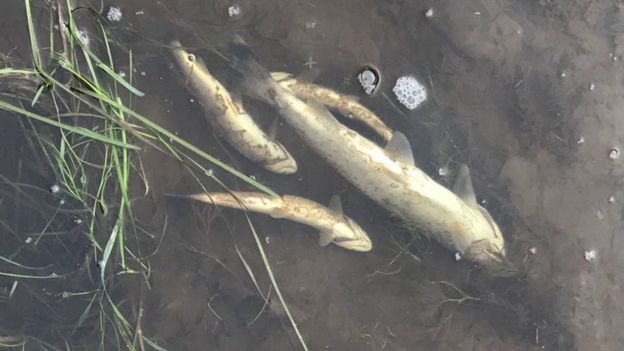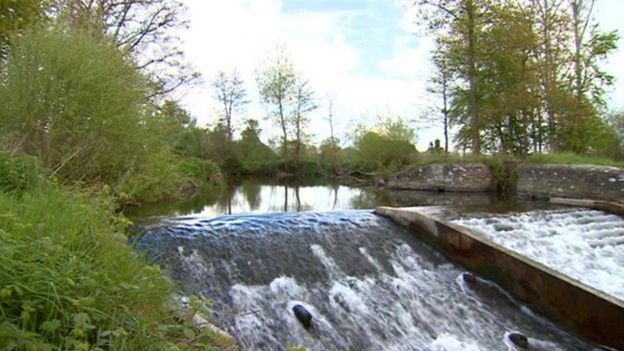Another for Charles Dakin from Luggs Mouth 10lbs f/c
Two for Tom Lane from Carrots this time, 8 and 12 f/c
Wyesham two. George Adams 25lb on f/c and Tim Risdale 12lbs on fly.
Vanstone, Goodrich 10 to Ken Halbert, spinning.
Three fish yesterday for Don Macer Wright from Wyebank. 10,10 and 12lbs on a Flamethrower
9lb fish from Holme Lacy 4 to Robin Hemming f/c
Three fish reported from Lower Symonds Yat on Nymph, fly and spinner 8-12and 16lbs toMartin Bowler.
Bit like a bus. You wait for one and another -or two comes along. Yet all the other bus stops are empty!
Didn't we all know this anyway? Just wonder if the said Kate Adams at the end of this piece would be more specific just where water quality and trout numbers have improved. From returns its certainly not the Lugg or the Arrow is it? Nor the Wye and USK catchments with plumeting fry and parr figures.
As for Mr Marsh Smith has he not been dealing with these problems at huge expense in the above said Wye and Usk catchments. If so to what effect!!
River groups attack Natural Resources Wales' record

River and fishing groups have rounded on Wales' environmental regulator Natural Resources Wales, branding it "no longer fit for purpose".
Budget cuts have meant it is failing in its duty to protect and improve fisheries, the charities claim.
Levels of pollution, particularly from farms, are "out of control", warned Afonydd Cymru and the Angling Trust.
Ministers said despite grant reductions it had not impacted on NRW's "ability to deliver their statutory duties".
Meanwhile, NRW admitted it faced "challenges" around pollution but said the organisation was trying to work differently "and work smarter".
NRW was formed in 2013, by merging the Countryside Council for Wales, the Environment Agency and the Forestry Commission, designed to be a one-stop shop for the environment.
One of its duties is to monitor the health of Wales' rivers, taking action against people or companies who pollute them.
Soil, fertiliser and slurry from farms as well as waste from industry can find its way into rivers, killing fish and the aquatic insects they feed on.
Water pollution caseload
April 2013 to December 2016
- 6,886 reports of water pollution
- 60% investigated
- 41 prosecutions
- 10 civil sanctions
Figures show NRW received 6,886 reports of water pollution between April 2013 and December 2016.
About 60% were investigated, but there were just 41 prosecutions and 10 civil sanctions - which amounts to less than 1%.
Mark Lloyd, chief executive of the Angling Trust and Fish Legal, said the regulator needed to take a much tougher stance but did not have "the resources to investigate properly".
The NRW argues that it is misleading to equate effectiveness with the numbers of prosecutions, saying it takes enforcement action "where appropriate".
NRW has seen its budget squeezed repeatedly by Welsh Government.
Its total revenue and capital income is forecast to fall by £20m over three years, assuming cuts of 5% a year.
"They've lost a lot of their frontline staff and are unable to take concerted action," Mr Lloyd claimed.
"The organisation is unwieldy, too bureaucratic and they don't seem to have a strategy - I just think they're failing in their duty to protect the environment."
 STEFFAN JONES
STEFFAN JONES
After a severe pollution incident killed thousands of fish on the River Teifi in Ceredigion in December 2016, Mr Lloyd wrote to Environment Secretary Lesley Griffiths to outline his concerns.
This was "by no means an isolated case; there have been a number of similar high profile pollution incidents in Wales in recent years," he said, with "the most important rivers" for fishing and biodiversity affected.
He claimed it highlighted a "national failure of Welsh Government" to tackle the problem.
Dr Stephen Marsh-Smith, chief executive of Afonydd Cymru, the umbrella body representing Wales' six rivers trusts, said he agreed with the comments made in the letter.
"We've seen terrible disasters in Wales, not just spot pollutions but the general diffuse pollution and the organic content that's going into rivers and really degrading them badly," he said.

The impact on fish stocks had been "devastating", he said and that had ramifications for the rural economy as well as the environment.
So could there be lessons for Wales from a project undertaken just across the border in Herefordshire?
There, England's Environment Agency is taking "a really proactive approach", according to Dr Marsh-Smith, partnering with the Wye and Usk Foundation.
Farms at risk of enforcement action for polluting the River Arrow, a tributary of the Wye, are identified and visited by the regulator.
They are then signposted to one of six Wye and Usk Foundation farm officers who can offer free, confidential advice about measures to prevent the problem.
Kate Adams, head of land use at the charity said the scheme was working "very well" and they had seen "localised improvements to water quality and an increase in river trout numbers".
She is working with Welsh Water to bring a similar project to west Wales.

No comments:
Post a Comment
Note: only a member of this blog may post a comment.